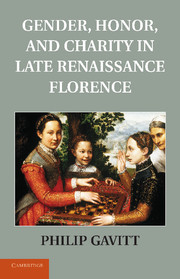Book contents
- Frontmatter
- Contents
- Acknowledgments
- Introduction
- 1 Charity, Discipline, and State-Building in Cinquecento Florence
- 2 Gender, Lineage Ideology, and the Development of A Status Culture
- 3 Law And the Majesty of Practice
- 4 Innocence and Danger: Pedagogy, Discipline, and the Culture of Masculinity
- 5 From Putte to Puttane: Female Foundlings and Charitable Institutions in Florence
- 6 Unruly Nuns: Clausura And Confinement
- Conclusion: The Honor of God, of the City, and of Their Own Houses
- Bibliography
- Index
- References
Introduction
Published online by Cambridge University Press: 07 September 2011
- Frontmatter
- Contents
- Acknowledgments
- Introduction
- 1 Charity, Discipline, and State-Building in Cinquecento Florence
- 2 Gender, Lineage Ideology, and the Development of A Status Culture
- 3 Law And the Majesty of Practice
- 4 Innocence and Danger: Pedagogy, Discipline, and the Culture of Masculinity
- 5 From Putte to Puttane: Female Foundlings and Charitable Institutions in Florence
- 6 Unruly Nuns: Clausura And Confinement
- Conclusion: The Honor of God, of the City, and of Their Own Houses
- Bibliography
- Index
- References
Summary
ISaiah Berlin's reconstruction of the fable of the hedgehog and the fox, in which the former knows one big thing and the latter many little things, does of course admit the logical possibility of a species that knows one little thing. The fear of that possibility is at the center of this book, which began as an extension into the sixteenth century of the work I had begun with my first volume, Charity and Children in Renaissance Florence. Further research into the hospital's archives and in the state archives of Florence began to reveal an institutional pattern that the Innocenti shared with many other charitable institutions during the sixteenth century: the subversion of its original charitable mission to receive orphans and foundlings by increasing attention to the limited choices female foundlings had to face when they reached marriageable age. Even if their destiny was not irrevocably fixed, they shared with the nun of Monza the consequences of an age in which the enforcement of the rule of patrilineal inheritance became less flexible and in which competition for inheritance seemed to leave both boys and girls with institutions rather than families as their last resort.
- Type
- Chapter
- Information
- Publisher: Cambridge University PressPrint publication year: 2011



